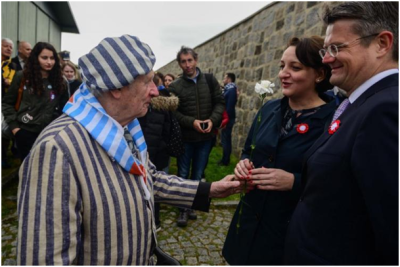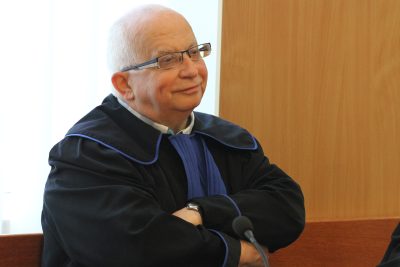The written justification for the Supreme Court's groundbreaking ruling on the use of the phrase "Polish death camps" has now been published. This marks a pivotal step in the ongoing fight for truth and Poland's reputation, paving the way for such cases to be heard and adjudicated within the Polish legal system.
Nearly 80 years after the end of the Second World War, the misleading term “Polish death camps” continues to surface. It is not just a matter of slips from German news outlets; deceptive phrases also appear in British, American, and French media — each instance wounding the memory of the victims and obscuring the responsibility of the perpetrators. For survivors of the camps, it inflicts further pain. This is why the case, pursued for years by attorney Lech Obara from Olsztyn, his law firm, and the Patria Nostra association, carries such deep importance. The Supreme Court’s recent ruling in February 2025 represents a symbolic breakthrough, offering Poles hope that the truth can be defended and apologies can be pursued through Polish courts. The key to this breakthrough, however, lies in the justification of this ruling.
The Story of Stanisław Zalewski

Stanisław Zalewski, a 99-year-old survivor of the Holocaust, has spent decades telling about true horrors of the German concentration camps. As a young boy, he was imprisoned in Auschwitz before being transferred to Mauthausen and Gusen. He endured starvation, disease, forced labor, and humiliation. After the war, he became a tireless advocate for historical truth, speaking at schools and commemorative events to preserve the memory of his fellow prisoners. In 2017, when a Bavarian news outlet referred to Treblinka as a “Polish death camp,” Zalewski felt deeply betrayed. It wasn’t enough for him to have the phrase removed. He sought an official apology, compensation, and a guarantee against future misrepresentations. For Zalewski, the lawsuit is not about financial gain but about defending the honour of those who can no longer speak for themselves.
“I know I don’t have much time left, but I won’t give up,” Mr. Zalewski stated when questioned about his commitment to the cause. “I am doing this for the memory of my father, my brothers in the camps, and for the sake of truth.”
Hope for Justice
The path to justice in Poland was anything but straightforward. The court of appeal dismissed the claim, and the Court of Justice of the European Union (CJEU) ruled that if a publication does not identify the victim, a court in that person’s country cannot hear the case. This legal conflict—between the right to a trial in the victim’s home country and the principle of identifying a specific injured party—lay at the heart of the issue. While Polish courts have acknowledged n several instances that national identity and dignity are personal rights protected by law, Polish judges have also had to consider the CJEU’s interpretation. This effectively blocked claims where the offensive term was was general rather than aimed at a named individual.
Still, the Patria Nostra lawyers did not give up. They appealed, invoking the so-called “mosaic rule.”
The Mosaic Rule
The mosaic rule, as cited by the Supreme Court, is a concept which originates from the legal precedents set by the Court of Justice of the EU. In simple terms, it means that a person harmed by a publication—such as an online article—can seek legal redress in any country where the content was accessible and caused harm, but only to the extent of the damage incurred within that specific country. In other words, a Polish court can rule on the portion of harm caused within Poland by defamatory content, even if the authors of the content are based abroad.
The Supreme Court sided with the lawyers from Olsztyn. It was more than just a procedural win. For people like Stanisław Zalewski, it offers a chance to hear the words “we are sorry” while they are still alive.
“Former prisoners are passing away. We must do everything possible to ensure they see justice served,” says attorney Obara.
ZDF, Netflix, Die Welt
This was not Patria Nostra’s first legal victory. The earlier case of Karol Tendera also set a precedent when he won an apology from the German broadcaster ZDF for using the term “Polish death camps” on its website in 2013. ZDF tried to evade the ruling, forcing Polish lawyers to initiate enforcement proceedings in Germany. Sadly, Karol Tendera passed away before the broadcaster fully complied with the court’s decision. He did not live to see full satisfaction.
Patria Nostra also brought a case against Netflix over a map featuring the inscription “Polish camps” in a documentary series. Following numerous protests and interventions, the platform was forced to correct the inaccurate material. The association has also taken action against news outlets such as Focus Online and Die Welt, and many other publications. For them, each case is not only a fight to protect Poland’s reputation but also a lesson for global media outlets about the consequences of their words.
Founded in 2009, the Patria Nostra association was created in response to the widespread misuse of terms such as “Polish concentration camp,” “Polish death camp,” “Polish Nazis,” or “Nazi Poland” abroad, which were described as “defective memory codes” that distort history.
Pro Bono

Lech Obara is a seasoned lawyer from Olsztyn who has dedicated years to advocating for those who would otherwise be unable to undertake the fight alone. The Patria Nostra association brings together lawyers, historians, and witnesses to history. Its legal team (including Mr. Obara, Mr. Szymon Topa, and others) provides pro bono representation to former prisoners and their families in legal battles against foreign media. They organise debates, publish corrections, send formal letters to editors, and monitor media coverage.
As president of Patria Nostra and attorney for the plaintiffs, Lech Obara has become a symbol of the unrelenting pursuit of truth. For him, this is not a semantic argument— it is a matter of dignity. It is about whether Polish courts will stand up for historical accuracy and protect the memory of victims from distortion. Thanks to his efforts and the collective work of the Patria Nostra association, Poland has the opportunity to establish a significant precedent in legally safeguarding its reputation, ensuring that no one can use the term “Polish camps” with impunity when referring to Nazi death camps.
Jan Berdycki

COMMENTS